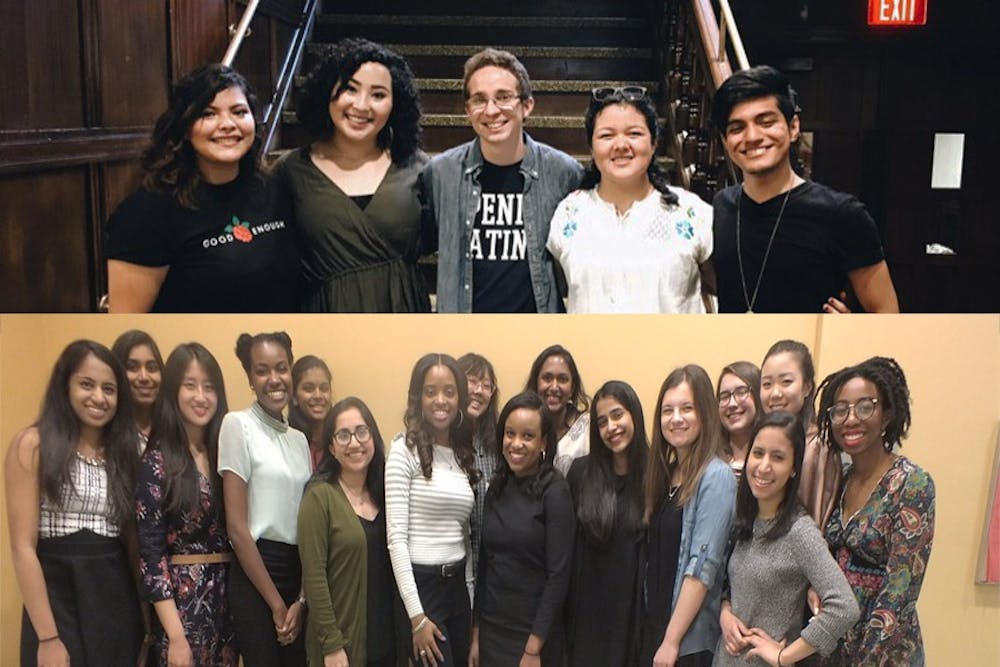
At Penn, umbrella organizations are often established with the goal of providing representation for individual student groups, though the application processes to join some of these these coalition organizations can be more selective than students might think.
Penn's main undergraduate coalition organizations include the LatinX Coalition, Asian Pacific Student Coalition, United Minorities Council, Penn Association for Gender Equality and Lambda Alliance. Of these organizations, LatinX Coalition, APSC and UMC require both formal written applications and presentations before they consider admitting a constituent group. UMOJA, an umbrella organization that is part of the five different umbrella coalitions which represent minority groups on campus, did not respond to request for comment on this article.
On Oct. 11, two student organizations applied to be constituent members of APSC: Wharton Korea Undergraduate Business Society and Australians and New Zealanders at Penn. While Wharton KUBS was accepted, ANZAP was not.
“I was pretty surprised at the outcome,” Club Singapore President and College and Wharton sophomore Judy Hong said, referring to ANZAP’s rejection. “I didn’t expect it go that way, and for me, APSC has been a lot about representation. It is not a decision that I personally support.”
ANZAP declined to comment on the article.
Wharton KUBS and Club Singapore are just two of the 24 constituent groups in APSC, which was founded in 1995 to serve as an umbrella organization for the Asian-Pacific Islander community.
APSC, like many other umbrella organizations, has a formal application process and presentation session. To officially become a constituent, an applicant group must earn a three-fourths majority from a vote at the general body meeting, APSC Chair and Wharton senior Yen-Yen Gao said.
Hong noted that APSC might be more selective today than it was a decade ago because of its larger size, adding that applicant groups today seem to be evaluated based on what they can offer to other constituent groups.
“Club SG is a small constituent group and pretty internally focused — if we had applied to be part of APSC today, perhaps we would not have been accepted,” Hong said.

Vice President of APSC constituent Wharton China Business Society and College junior Kara Hu said it is important to APSC that groups are self-sufficient and well-established before they join the umbrella organization.
Multiple APSC constituent groups also noted the importance of financial self-sufficiency, which is a factor in the application process.
APSC is funded by the Pan-Asian American Community House, which receives funding from the Vice Provost of Undergraduate Life. APSC receives $2,500 per semester, $1,250 of which gets allocated to constituent groups. The amount of funding has remained constant for the last few years, Gao said, despite an increase in the number of its constituent groups.
College junior Kara Dang, president of Penn Vietnamese Students' Association, said she thinks that a level of selectivity is important for groups joining umbrella organizations because the pool of resources is limited.
“These are great resources we all share in our umbrella organization,” she said. “I don’t think that we should be preventing organizations from having that, but I do think it is important to be self-sufficient and be quite developed [when applying].”
However, constituents also noted the value of being in APSC, raising questions on the implications of rejecting groups seeking that representation.
“Being in APSC is truly a privilege for VSA,” Dang said. “With these privileges and access to resources comes great responsibility, and having this umbrella organization advocate for our causes is so important to the API community.”
Some umbrella organizations are less selective in admitting constituents.
The Lambda Alliance, which formed in 2005, does not place emphasis on funding during the application process because all of its constituents receive funding directly from the LGBT Center without going through Lambda. As a result, groups interested in joining know that they have "a high chance of being accepted as a constituent," said Vice Chair of Lambda and College junior Chloe Cheng.
Lambda is the only umbrella organization of the five that were interviewed that does not directly fund its constituent groups. The four other organizations receive funding from sources like VPUL to distribute to their constituents. Lambda also requires incoming groups to put up a presentation for existing constituents, but does not require the completion of a formal application.
The constituent affairs chair of Penn Association for Gender Equity and Engineering sophomore Curie Shim said the group has not denied groups yet, but was taking record of the groups within PAGE that were active and fulfilling constituent duties.
Chair of the United Minorities Council and College senior Krisna Maddy said the umbrella organization has not had issues with turning down organizations and has worked to provide a space for groups which would not generally fit under other coalitions.
Similarly, Chair of the Latinx Coalition and College junior Caleb Diaz said that as long as a group "fills a niche or shows how [they'll] add on to the LC," they will be accepted.
“A lot of groups are really small but we take them anyways because we know there’s a need and that there needs to be representation," Diaz said.
Gao said it can be difficult to compare the application process for umbrella organizations because they are often designed to serve the needs of that specific community.
“While APSC represents the interests of the [Asian-Pacific Islander] community, other umbrella groups serve other communities and have very different goals, which is why it’s hard to compare the constituent process,” she said.
The Daily Pennsylvanian is an independent, student-run newspaper. Please consider making a donation to support the coverage that shapes the University. Your generosity ensures a future of strong journalism at Penn.
Donate







